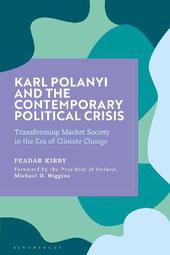
|
Karl Polanyi and the Contemporary Political Crisis: Transforming Market Society in the Era of Climate Change
Hardback
Main Details
| Title |
Karl Polanyi and the Contemporary Political Crisis: Transforming Market Society in the Era of Climate Change
|
| Authors and Contributors |
By (author) Peadar Kirby
|
| Physical Properties |
| Format:Hardback | | Pages:256 | | Dimensions(mm): Height 234,Width 156 |
|
| Category/Genre | Social and political philosophy |
|---|
| ISBN/Barcode |
9781350117822
|
| Classifications | Dewey:335 |
|---|
| Audience | | Tertiary Education (US: College) | |
|---|
|
Publishing Details |
| Publisher |
Bloomsbury Publishing PLC
|
| Imprint |
Bloomsbury Academic
|
| Publication Date |
10 December 2020 |
| Publication Country |
United Kingdom
|
Description
Has politics reached breaking point? Rather than defending liberalism or abandoning it, how can a socially just and ecological alternative be built? Peadar Kirby investigates the causes of our current multifaceted global crisis by drawing on the work of Karl Polanyi. This book explores Polanyi's theory that social disruptions result from the attempt to run society according to the rules of the market. Drawing on these ideas, it outlines pathways towards an alternative future that overcome weaknesses in Marxism. Linking the ecological, political and socio-economic crises, Kirby identifies that an alternative socio-ecological model is emerging, consistent with the insights of Polanyi. Karl Polanyi and the Contemporary Political Crisis is an urgent intervention into key debates on the future of politics, on the low-carbon transition, on automation and on the emerging world order.
Author Biography
Peadar Kirby is Emeritus Professor of International Politics and Public Policy and Director of the Institute for the Study of Knowledge in Society, at the University of Limerick, Ireland.
ReviewsOur increasingly unstable world is not lacking contemporary examinations of the forces remaking it: the climate emergency, a crisis of economic and political legitimacy, technological transformation, and urgent debates over how we conceptualise our relationships to place, borders, social identities and each other. But few writers have been bold or skilful enough to pull these complex threads together and successfully anchor their analysis in the intellectual history of thinkers who can help us make sense of how we got here, and where we might be going next. In his vital and brilliant study of Karl Polanyi's relevance in the 21st century, Peadar Kirby has not only achieved this but also sketched out the beginnings of the world we need to fight for. * Jack Shenker, journalist and author * Polanyi is the inspirational thinker, whose work grasps the zeitgeist of our times. His genius is recaptured in Professor Kirby's magnificent book that will enthral readers in search of meanings and explanations for the disturbing state of the planet. * Fred Powell, Professor of Social Policy, University College Cork, Ireland * Peadar Kirby undertakes a new reading of Polanyi and discovers a fertile narrative to confront today's manifold crises - the recovery of the public world. It provides a novel thread to guide us through and beyond this second 'age of unprecedented transition'. * Ian Gough, Visiting Professor in CASE and Associate of GRI, London School of Economics and Emeritus Professor, University of Bath, UK * Kirby's book must be read by Polanyi scholars, students, activists, journalists and policy makers. In analyzing the roots of contemporary crises, Peadar Kirby brings Karl Polanyi into conversation with critical contemporary thinkers, including Paul Mason, Wolfgang Streeck, Kate Raworth, Ian Gough, among others. Identifying this period as a Polanyi moment of unprecedented transition, for Kirby, Karl Polanyi is the inspiration for a new eco-social paradigm rooted in a diversity of citizen based initiatives around the world that will shape the contours of a new society and rescue humanity from crisis. * Marguerite Mendell, Distinguished Professor Emerita, School of Community and Public Affairs and Director of the Karl Polanyi Institute of Political Economy, Concordia University, Canada *
|